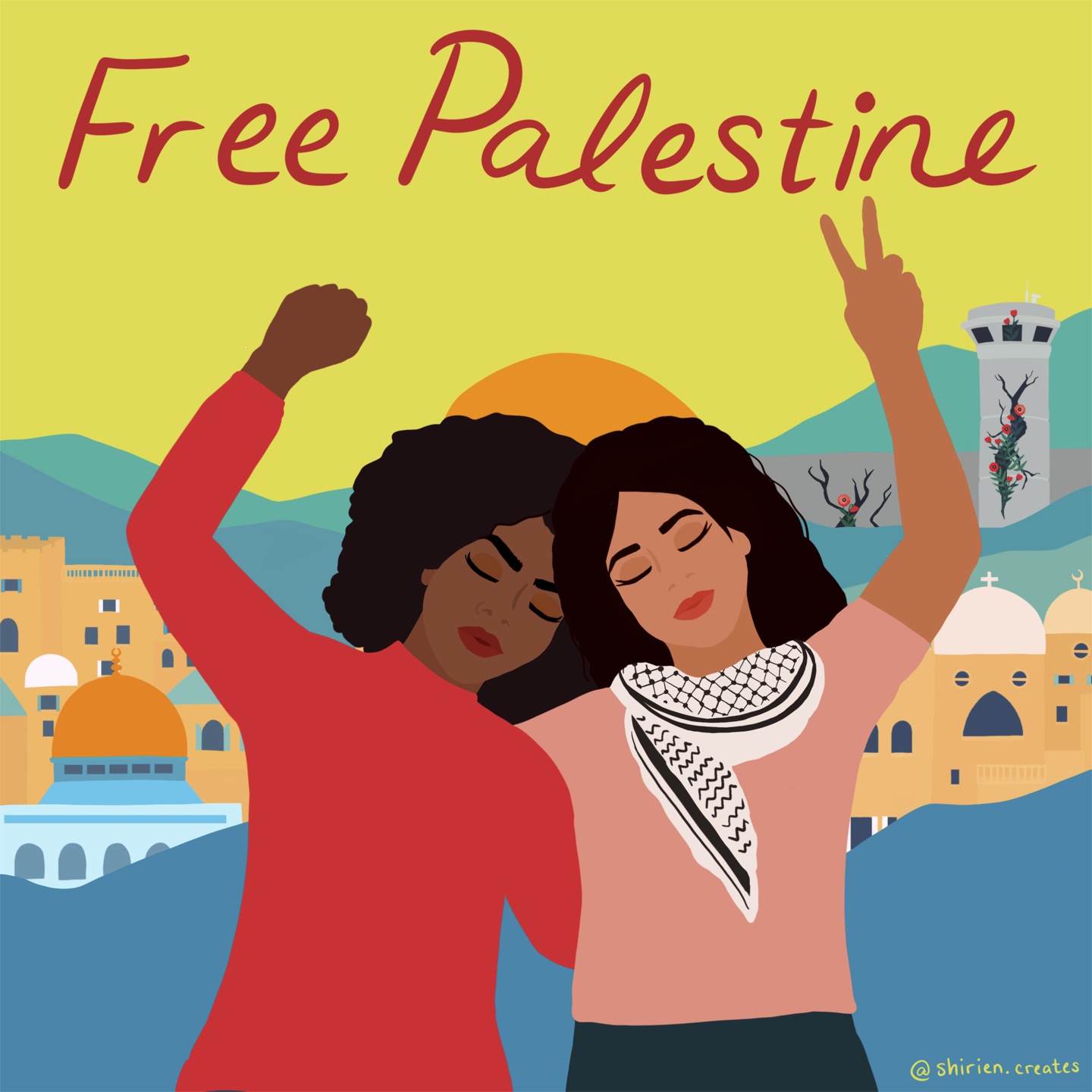
Art by Shirien Creates
By: Movement Generation
We the people have been in continuous spirals of grief for so much of our history. Some of us have lived through war. Some carry the trauma of our ancestors who were stolen from our lands or had to flee or defend our homes. Some continue to experience daily violence on the streets we call home—from East Oakland to the West Bank, from police brutality and military occupation to climate disasters that lead to displacement and disconnection.
These spirals of violence that make the extractive economy go round will collapse on the oppressed and can only end justly through our intentional reorganization. In this moment of collective grief over the tragedies across all of historic Palestine, our lineages of resistance and resilience give us the power right now to fight for collective liberation and just futures.
Ecological justice is the state of balance between human communities and healthy ecosystems based on thriving, mutually beneficial relationships and truly democratic, participatory self-governance. There is no ecological justice in a world in which Palestinians are bombed, starved, displaced from their lands, and have no freedom of movement or agency over their lives. For generations we have seen the British colonial occupation and the subsequent 75-year occupation by the apartheid state of Israel wreak ecological havoc on historic Palestine and its people; these are textbook examples of the extractive economy in full force.
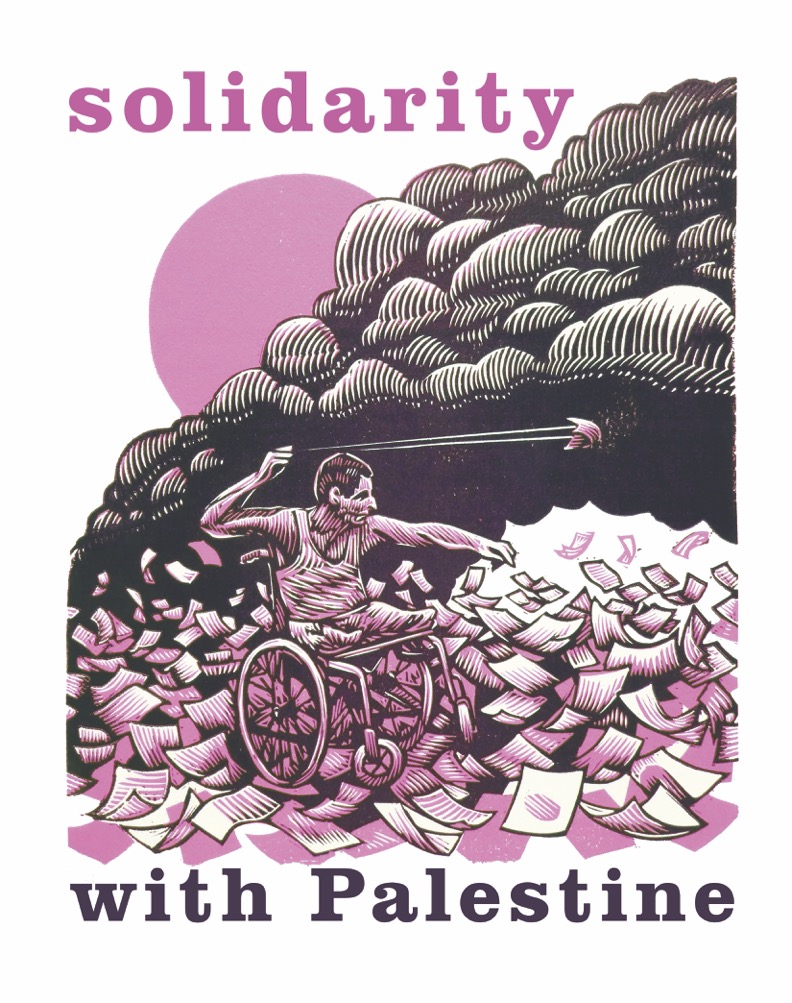
Art by Roger Peet
Whatever fantasy the ideology of zionism fabricates, we know that the ongoing war on Palestine is about land and resources. It is a settler colonial project by its own definition. Enclosure is the mechanism by which the settlers control access to needed resources, including land, water, food, labor, and knowledge. All enclosure is based on entitlement and acquired, enforced, and expanded through violence, which is foundational to colonialism, imperialism, and extractivism. This unrelenting violence is waged against peoples and the ecosystems they call home. As apartheid Israel forces Palestinians further south while leveling homes, hospitals, and holy places, its war on Gaza is another violent land grab. Palestine was never “a land without a people.” Palestinians are inextricably linked to their lands. Indigenous sovereignty is key to ecological justice.
Ecological warfare on Palestine
Once an agricultural place within the Fertile Crescent, Gaza’s soil, water, and air are now contaminated by chemicals from 16 years of endless bombardment. In a recent teach-in, a representative from the Union of Agricultural Work Committees (UAWC) in the West Bank said that even if Palestinians in Gaza survive the bombings, they will be condemned to a future without sustenance. Much of the most fertile farmland in Gaza today is near the so-called border in the north, which is a vulnerable target of Israeli air strikes, making it dangerous for both access and soil health.
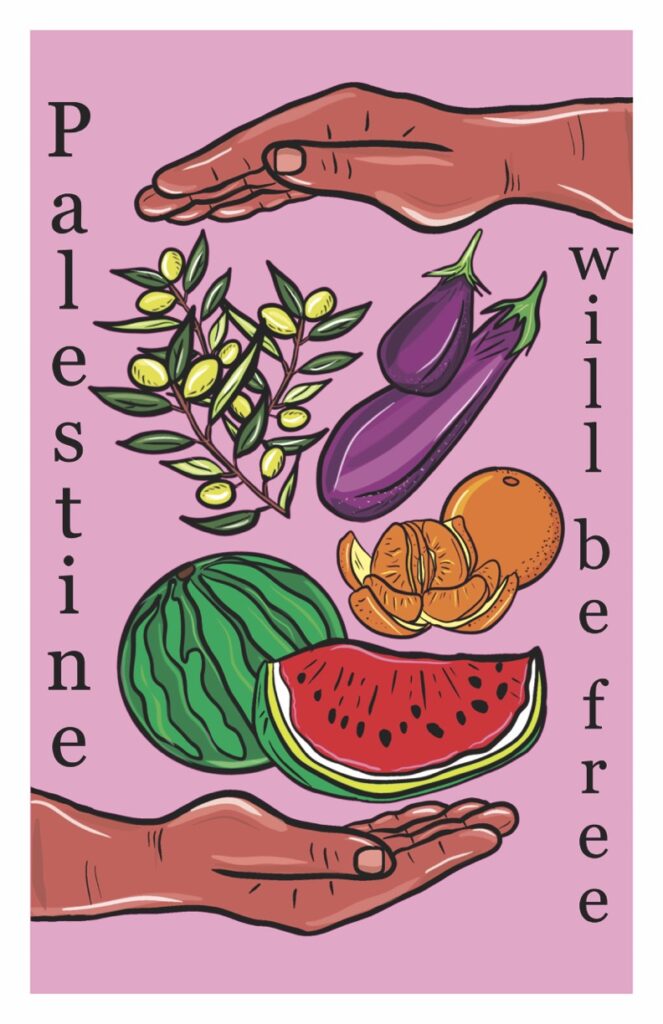
Art by Lourdez Puti’on Velasco
In the West Bank, even before October 7, 46% of agricultural land was inaccessible to Palestinian farmers due to a blockade, military occupation, and the use of “special military zones” to annex more land from the West Bank. Right now during the olive harvesting season, an important time for Palestinian livelihood, farmers are experiencing escalating harassment from Israeli settlers and military, further blocking their access. Yet, the power of enclosure is not simply the ability to restrict access. The real power is the ability to control the terms and conditions under which people have access to the resources that are enclosed.
Following Israel’s occupation of East Jerusalem, the West Bank, and Gaza in June 1967, one of the first policies the apartheid state enacted was taking complete control of Palestinians’ water resources and infrastructure. Issa Nijoum, a former citrus farmer from Al-Auja said to Amnesty International, “In 1967, when they [the Israeli authorities] started taking the water it was like a sickness in a body… slowly the land dried up.”
Apartheid Israel’s draconian water policies have not only robbed Palestinians of their water sovereignty, it has also had terrible consequences on the ecosystem and taken countless Palestinian lives. We often hear about Palestinian deaths by airstrikes (more than 9,000 and counting in Gaza between October 7–November 1); though deaths by water-borne diseases, while harder to account for, are significant. Ninety-seven percent of the water in Gaza is undrinkable, by World Health Organization standards. According to the Palestinian Environmental NGOs Network (PENGON), Israeli settlers use Palestinian land as a dumping ground for 90% of Israel’s waste water.
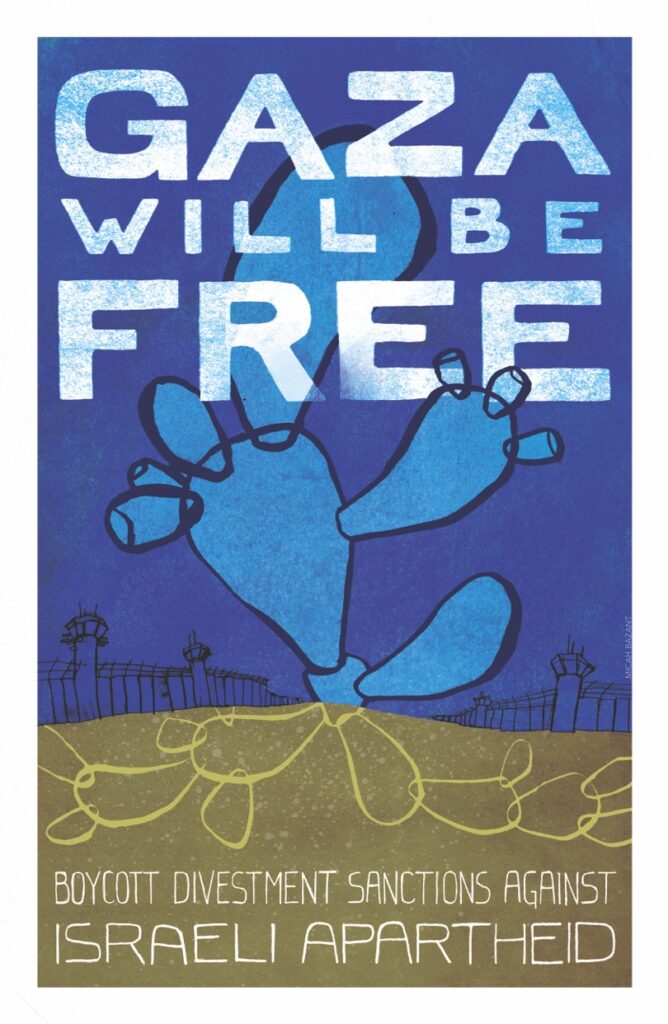
Art by Micah Bazant
A 2021 UN report shows that 75% of sea water off the Gaza coast is contaminated with chemicals from weapons and sewage. Already, Palestinian fisherfolk were heavily restricted from accessing the sea—three to six nautical miles offshore only or risk being shot. With the water contamination decimating fisheries, it is even more difficult for fisherfolk to sustain a living, let alone feed the people. On top of that, apartheid Israel recently granted exploration licenses for natural gas off the Mediterranean coast to six companies—disaster capitalism in the midst of genocide.
From the river to the sea
All of the food, water, and environmental issues are, of course, exacerbated by apartheid Israel’s current siege and war on Gaza. Not only does relentless bombardment immediately pollute the air, water, and soil; long-term, imperialism inherently leaves a legacy of ecological destruction on the land, human bodies, and spirits that is felt for generations to come. For all of these reasons and more, the path to ecological justice must run through a free Palestine.
The irony of it all is that borders are constructs. You can’t stop the waters from flowing together; all people from the Jordan River to the Mediterranean Sea breathe the same air. Destruction of the land in Palestine condemns current and future generations of Palestinians and those who are there through the settler-colonial project to suffer the ecological destruction of this war and genocide, just as the land does.
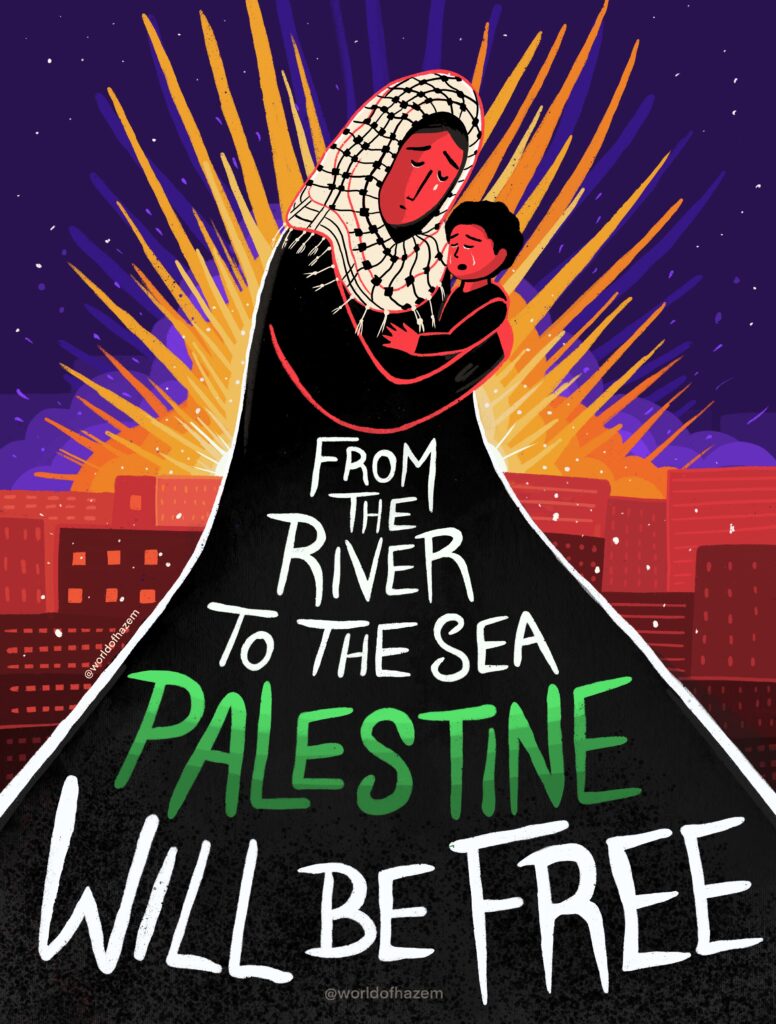
Art by Hazen Asif
Like all enclosures, borders fragment human communities and ecosystems, asserting extractive, violent governance systems rather than systems based on bioregional relationships of collective care, sacredness, cooperation, and consent. “From the river to the sea” refers to the ecological boundaries of historic Palestine and all its peoples and all their diverse cultures. It is a call to freedom, true democracy, reparations, and restoration. What does a free Palestine look like, from the river to the sea, where borders are nonexistent and the land and all people are liberated?
Where do we go from here, and how do we get there?
Clearly a culture shift is desperately needed. We can return to the Just Transition framework to reaffirm that the extractive economy—upheld by a colonialist worldview that fuels extraction and exploitation towards the enclosure of wealth and power, enforced by militarism—is the worst possible way forward for a vast majority of us. A worldview centered around caring and sacredness, where regeneration and cooperation lead to ecological and social well-being, bolstered by true democracy, is necessary and possible.
So how do we get there? We don’t have all the answers, but for starters we can commit to honoring Palestinian self-determination and take our guidance and leadership from Palestinians in Palestine—many of whom are courageously documenting the atrocities via social media, even as journalists in the region are targeted and killed by the apartheid state of Israel. We also look to Palestinian-led organizations that are supporting people on the ground, such as Palestinian Centre for Human Rights, as well as global organizations like Grassroots International, Arab Resources and Organizing Center, Adalah Justice Project, Palestinian Feminist Collective, and Palestinian Youth Movement.
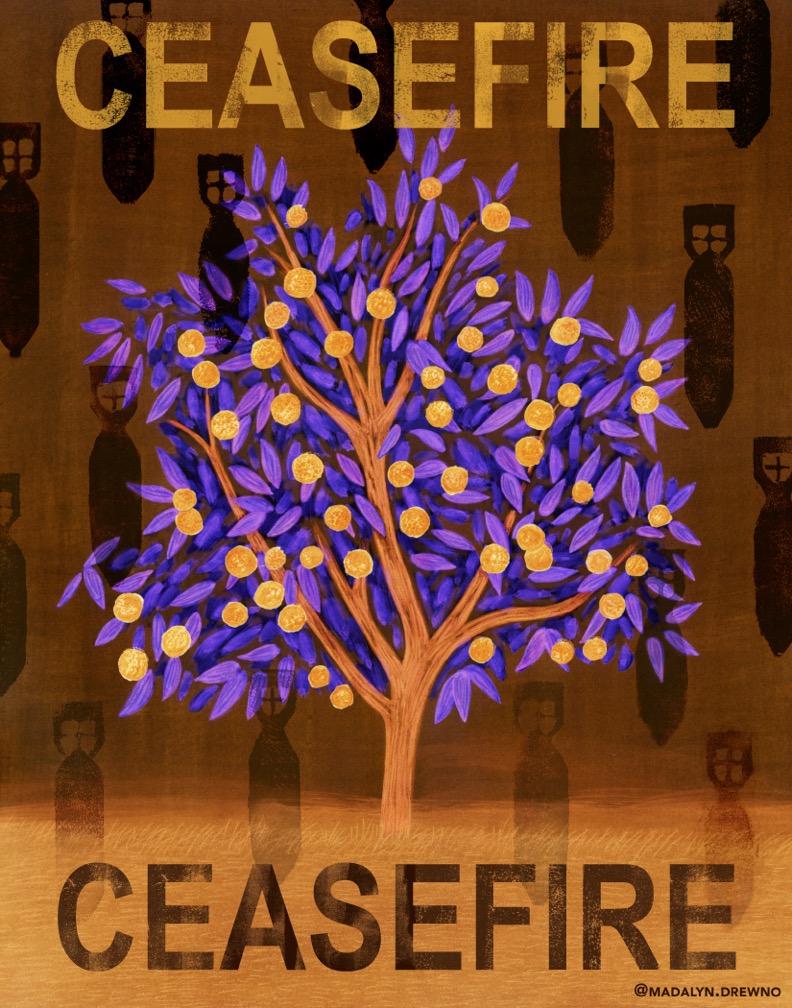
Art by Madalyn Drewno
The peoples’ immediate demand is a ceasefire now and an end to the siege on Gaza. This requires our urgent political pressure on US elected officials, as well as direct actions such as mass protests and boycotts. And we must continue to be visionary while oppositional. A ceasefire is imperative to stop the bad, but the battle will not end there, leaving Palestinians and Israeli settlers in the status quo of cyclical violence. Moving in the same direction as the ongoing movement to end Israel’s occupation, genocide, and apartheid gives us a pathway to restore Palestinians’ right of return, self-determination, sovereignty, and land back.
Because all ecological and human rights disasters are rooted in the political economy, we must make economic interventions. Here in the belly of the beast of the US empire, we spend $3.8 billion of our tax dollars each year on military aid to apartheid Israel. Cutting off this aid so that it can instead fund our basic needs such as housing, health care, and education will be an uphill climb and a critical goal.
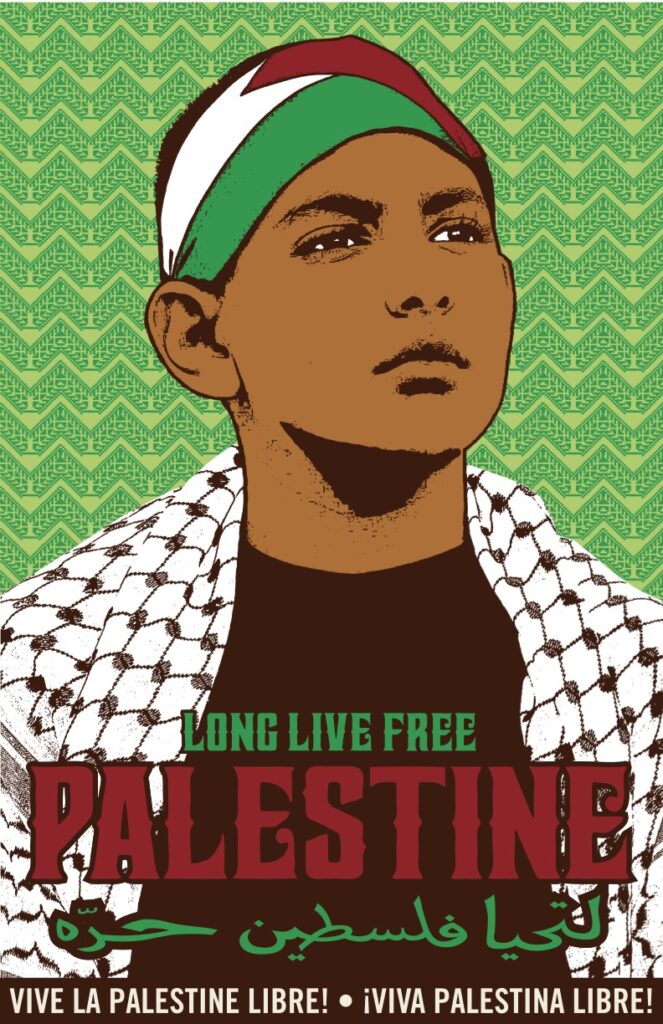
Art by Dignidad Rebelde
Here’s a list of concrete actions that Palestinian support groups are asking as we move in sync towards liberation:
- Organize around the Boycott, Divestment, and Sanctions (BDS) movement.
- Join pro-Palestine protests in your locale.
- Phone bank to call for a ceasefire. Do it daily. Three times a day even.
- Funders: Sign a philanthropy open letter calling for a ceasefire.
- Donate to humanitarian and medical aid for Palestine: Palestinian Medical Relief Society, Palestine Red Crescent Society, Medical Aid for Palestinians, Doctors Without Borders.
- Donate to Grassroots International’s Emergency Fund for Palestine, which goes directly to movements on the ground doing relief work.
- Refuse silence and consent by pushing back on false media narratives and amplifying Palestinians in Palestine.
And we cannot underestimate the power of engaging in generative conversation and conflict within our communities; talk to your people and learn together. Make space for grief and connection in this intense time; hold your loved ones close and stay rooted in deep love for people and the land. As our ancestor Grace Lee Boggs said, “Movements are born of critical connections rather than critical mass.”
Liberation is possible and, we have to believe, inevitable. Palestine will be free. In our lifetime.

